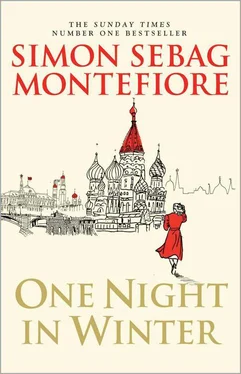It was a miracle that she survived the train journey to Pechora and Norilsk, unlike the people who died and whose bodies she saw tossed out of the moving carriages, not unlike the slaves she would soon see toiling on timber-felling and railway-building in all weathers, dying in the snows, left frozen stiff in their snowy tombs until they emerged, perfectly preserved, in the spring.
When she arrived in Pechora, she was assigned to the daily logging gangs but within a few days, the sleepless nights in the barracks, the starvation rations, the exhausting physical strain, prompted a fever so severe it brought her close to death. She lay in her dormitory considering the offers of leering camp guards and tattooed gangster bosses to become their mistress. How else could she survive? But the truth was she didn’t want to: she hoped to perish of heartbreak if not malnutrition or fever. What was there to live for? Her death would be her wedding gift to Frank, no less romantic and sacred for his never knowing of it.
Somehow she made it to the sanatorium, a hut with a few bloodstained mattresses and no medicines; there was a corpse lying next to her, a jagged mouth open in a final silent scream. There were no doctors. She passed in and out of consciousness – and then, one day, she opened her eyes.
‘You’re going to live, Serafimochka,’ said a familiar voice. And there was Dashka Dorova smiling down at her, and Serafima wondered if she was in heaven and looking down at the Golden Gates outside School 801 with George and Minka and Senka.
‘Dr Dorova, what are you doing here? Were you denounced for something?’
‘That’s the one thing we zek s never discuss up here. But in truth, I simply don’t know. Listen, dear, they’ve asked me to set up a camp hospital – for the guards as well, of course – and’ – she leaned over Serafima and whispered – ‘I’ve told them about your nursing training. Understood, angel? I need you.’
And so it was that, over the next few years, Dashka Dorova lobbied the MVD authorities tirelessly to get a few basic medicines and beds, and for any doctors or nurses in the camp to be assigned to her, thus saving her, Serafima, and the lives of many others in the process.
Gradually the two women came to trust each other. Smoking cigarettes, they often talked late into the evenings about the Children’s Case; and what it had all meant; and Serafima’s own contribution in encouraging the Fatal Romantics’ play-acting, in the hope that their make-believe world of poetry and romance would divert her classmates’ attention from herself and her secret.
At first, Serafima consoled herself by reciting ‘The Talisman’, by looking up at the blue of the sky every day and telling herself she would never stop loving Frank, and that they would be together one day, whatever happened. Over the many hours, years even, that she and Dashka smoked and drank Armenian arak – in the summer, tormented by clouds of mosquitoes on the stope of their hut, in winter around the fire, enshrouded by the perpetual night of the Arctic, days which were dominated by the petty triumphs, vicious feuds and fatal perils of camp life – Dashka talked about her children, and above all of her Senka, whose letters she read and reread and almost memorized. Patiently Dashka listened to Serafima’s speeches of love and regret, without telling her what she should do. But she guided her inch by inch to a new realization, a new Serafima. ‘Every love story’s a requiem,’ she told her. One night, Serafima looked at her, her eyes wild.
‘He’s never coming back,’ she said. ‘I’m never going to find him again. It was all just a dream that could never have come true. And all these years I’ve been living this lie.’
She got up, threw open the door of the hut and ran out into the snow. ‘Wherever you are, Frank, I release you. Be free!’ she shouted up at the rounded blue vault of stars. ‘Goodbye, my love!’
‘Get back inside, girl,’ ordered Dashka from the wooden doorway.
‘Does he hear me in America? Do you hear me, Frank? I’m a ghost to you now, and I don’t expect an answer. But I want you to live your life, and be happy.’
‘Hush! You’ll attract the guards and wake up the patients and you’re not even wearing a coat, you little fool. Come in!’ Dashka ventured out on to the snow in her fur slippers to grab Serafima and pull her back inside.
‘Feel better, darling Serafimochka?’ she asked her when they were sitting by the fire again. ‘You’ve done the right thing. Now you’ll be happier and you’ll be stronger to endure this new life of ours.’
Serafima took Dashka’s hand. ‘Thank you for all your patience.’
‘You’ll always have the scars,’ Dashka said. ‘The surgeons can never remove the fragments of shrapnel. They stay in your body forever, almost forgotten until one day, you’re jolted and then they’ll give you a pang of agony that makes you cry out. But you can live through it, I promise you that.’
Not for the first time, Serafima wondered about Dashka. She respected her as a former minister and doctor, but she was a very private person, an enigma, apparently so tough. Long blinded by Dashka’s sunniness, she saw there was shade there too.
‘You sound like you have some experience of this yourself?’
Dashka inhaled her cigarette and stared into the fire. ‘What’s important is not who you love but who loves you.’
Now, eight years later, Serafima said goodbye to Dashka on Yaroslavsky Station and watched her husband welcome her home. Like so many others, Serafima had not been able to get a message to her parents, but she eagerly sifted through the crowd of faces to see if someone had come to meet her. Some families had been notified; some did not know when their loved ones would be returning. She was just about to head out into the streets to wave down a car to drive her to her parents’ apartment when she spotted a familiar face with a diffident smile.
‘Andrei? Is that you?’ she asked, suddenly delighted to see him.
‘Yes,’ replied Andrei Kurbsky. He was still handsome in his wholesome way but much shabbier. ‘I’m so happy to see you.’
‘Who are you here to meet?’
‘You, of course.’
‘But how did you know I was on this train?’
‘I didn’t.’
‘How lucky we bumped into each other.’
‘Not quite luck. I didn’t like to think that there’d be no one here when you came home.’
‘How did you know that we were being released now?’
‘Your mother told me you were in Pechora. I asked a favour so I knew it would be sometime this month.’
‘This month? But that means—’
Andrei smiled and adjusted his heavy spectacles, blushing slightly. ‘Yes, I’ve met every train.’
‘Every night?’
‘Yes. It’s not so bad… I bring a book and smoke a few cigarettes and sometimes warm up with a jot of vodka. Oh, here, I have some for you.’ He gave her a small flask and she took a swig.
The vodka streaked its burning path down her throat.
‘Thank you, Andryusha!’ She took another shot. ‘I don’t have anyone else waiting for me. I don’t have anywhere to be…’
‘I know,’ he said. ‘That’s why I’m here.’
It struck her then that he must have always loved her, even when it was not clear she was alive or that she would ever return. She could see too he was not sure how much of this devotion to reveal, afraid that it might frighten her off.
‘But you never wrote… I never knew,’ she said.
‘How could I tell you?’ he asked. ‘I didn’t know where to begin.’
She raised her fingers to her face. ‘I look truly awful. I was once a little attractive but I must seem like a sort of witch now.’
Читать дальше












